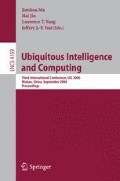Abstract
Pervasive computing paradigm is based on much more dynamic environment than the existing computing paradigm. Therefore, we need a middleware framework for efficiently integrating the pervasive objects. In this paper we propose an adaptive bridging approach for the interoperability of heterogeneous middleware. Here the objects are classified into hot or cool objects according to the requested frequency reported by the portable interceptors, and the cool spot objects and hot spot objects are assigned dynamic bridge and static bridge, respectively. The proposed approach is evaluated using a test bed comprising of three different platforms – JADE, MICO, and CALM – on nine servers. The experiment reveals that the proposed adaptive bridging approach significantly reduces the response time compared to the case of using only either static bridge or dynamic bridge, especially when the number of activated objects is relatively large.
This research was supported in part by the Ubiquitous Autonomic Computing and Network Project, 21st Century Frontier R&D Program in Korea and the Brain Korea 21 Project in 2005.
Access this chapter
Tax calculation will be finalised at checkout
Purchases are for personal use only
Preview
Unable to display preview. Download preview PDF.
References
ORB interoperability architecture (2002), available from http://www.omg.org/
Object Management Group. The Common Object Request Broker: Architecture and Specification. Revision 3.0.3, Object Management Group (2004)
Menasce, D.A.: MOM vs. RPC: communication models for distributed applications. Internet Computing 9(2), 90–93 (2005)
Jennings, N.R.: An agent-based approach for building complex software systems. communications of the ACM 44(4), 35–41 (2001)
JADE, Java Agent Development framework, web site: http://jade.cselt.it
IBM Japan Research Group “Aglets Workbench”, web site: http://www.trl.ibm.com/aglets
Kim, J.H., Ramakrishna, R.S., Kim, Y.S.: LODIN: load distribution mechanism in CORBA using interceptor. In: Proceedings of IEEE Region 10th International Conference on TENCON, vol. 1, pp. 61–64 (2001)
Gunwani, R.V., QiWang, Zheng, C.: Performance evaluation of middleware bridging technologies Performance Analysis of Systems and Software. In: IEEE International Symposium on ISPASS 2000, pp. 34–39 (2000)
Han, S.W., Song, S.K., Youn, H.Y.: CALM: An Intelligent Agent-based Middleware Architecture for Community Computing. In: Proceeding of SEUS-WCCIA 2006, pp. 89–94 (2006)
Author information
Authors and Affiliations
Editor information
Editors and Affiliations
Rights and permissions
Copyright information
© 2006 Springer-Verlag Berlin Heidelberg
About this paper
Cite this paper
Ko, H., Youn, H.Y. (2006). Adaptive Bridging with Portable Interceptor for Efficient Integration of Reflective Middleware. In: Ma, J., Jin, H., Yang, L.T., Tsai, J.JP. (eds) Ubiquitous Intelligence and Computing. UIC 2006. Lecture Notes in Computer Science, vol 4159. Springer, Berlin, Heidelberg. https://doi.org/10.1007/11833529_68
Download citation
DOI: https://doi.org/10.1007/11833529_68
Publisher Name: Springer, Berlin, Heidelberg
Print ISBN: 978-3-540-38091-7
Online ISBN: 978-3-540-38092-4
eBook Packages: Computer ScienceComputer Science (R0)

